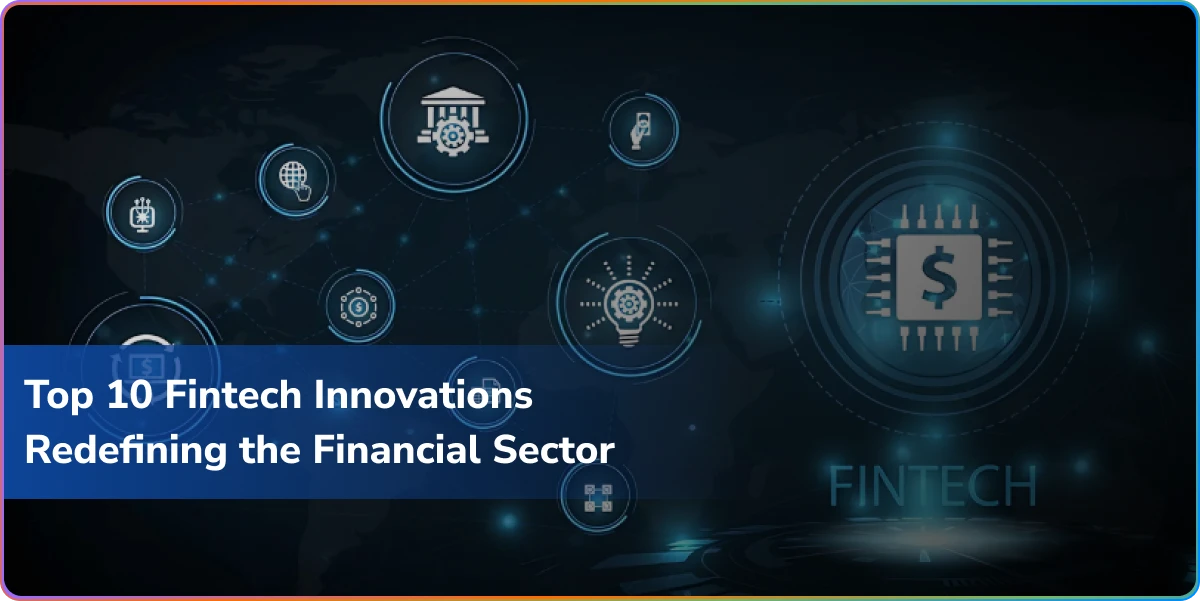Ever tried filing an insurance claim and wished it could be done in minutes instead of weeks? That’s exactly what fintech innovation is making possible in today’s insurance industry—speeding up processes, improving transparency, and creating smarter services for customers like you.
Last year, over 60% of insurance claims in the US were processed digitally. Just a decade ago, that number was under 10%—a clear sign that fintech is rewriting the rules of insurance
Curious about how fintech is transforming the insurance industry? In this blog, we’ll explain what is financial innovation, the types of fintech, and how fintech innovation under insurance category is creating real change. We’ll also look at the benefits of fintech and the future of fintech services in insurance.
Understanding What is Financial Innovation
Before we dive into insurance, let’s first understand what is financial innovation?
Financial innovation is the use of new technology and ideas to make financial services faster, safer, and easier.
In insurance, it includes AI-driven risk assessments, digital claims platforms, blockchain for secure transactions, and custom policies. Essentially, fintech is modernizing traditional insurance for a smarter, quicker experience.
Types of Fintech in Insurance
Ever wondered how fintech technology is making insurance smarter and easier for you? Fintech is changing the game, helping you manage your policies, file claims, and even save money—all without the usual hassle. Here’s a look at the key types of fintech in insurance:
- Insurtech Platforms – Choose a policy, file a claim, or track your insurance—all in one place. These platforms simplify the entire process.
- AI and Machine Learning – AI analyzes your data to predict risks, detect fraud, and suggest coverage that fits you perfectly.
- Blockchain Technology – Blockchain keeps everything transparent, prevents fraud, and speeds up claim approvals.
- Mobile Applications – Manage your policies, submit claims, and get support anytime, anywhere—right from your phone.
- IoT (Internet of Things) – Smart devices like connected cars or health trackers share real-time data, helping insurers adjust premiums and coverage based on your actual usage.
- Digital Payments & E-Wallets – Pay premiums or receive claim payouts instantly with secure digital options.
Fintech Innovation Under Insurance Category – The Game Changer
Fintech technology is transforming how insurers serve customers. Unlike general fintech tools, these solutions are designed specifically for insurance, making processes faster, coverage more personalized, and operations more transparent.
Real-life examples of Fintech Innovation Under Insurance Category:
Automated Claim Processing – AI and automation handle claims in just days or even hours instead of weeks. For example, a car accident claim can be approved and paid much faster, keeping customers happy.
Usage-Based Insurance (UBI) – Insurers track real usage, like car mileage or driving habits, to calculate premiums. Safe drivers pay less, making coverage fair and personalized.
On-Demand Insurance – Need coverage for a short trip, event, or rental? On-demand policies activate instantly, giving customers flexibility when they need it most.
Peer-to-Peer Insurance – Groups of people pool their money to share risks. This community-based approach can reduce costs and make insurance feel more personal.
By adopting these fintech solutions, insurers can deliver faster, smarter, and more customer-friendly services, making this one of the most impactful fintech innovations today.
The Role of Fintech Technology in Insurance Transformation
1. Insurance That Puts You First
Ever wished buying insurance felt as easy as ordering pizza? Now it can. With mobile apps and sleek websites, you can:
- Get instant quotes in seconds
- Compare policies without the fine-print headache
- File a claim while you’re sipping coffee—anytime, anywhere
- No more waiting in lines or dealing with endless forms.
2. Smarter Pricing, Thanks to Tech
Fintech tools like AI, big data, and IoT devices aren’t just buzzwords—they’re working for you.
- Drive less? Pay less. Vehicle telematics tracks your mileage.
- Wear a fitness tracker? Get health plans that match your lifestyle.
It’s insurance pricing that’s finally fair.
3. Fraud? Not on Fintech’s Watch
Insurance fraud costs billions, but AI and blockchain are like digital detectives. They:
- Spot suspicious claims instantly
- Flag fraud before it drains your policy
- Keep everything transparent so you always know what’s happening
Peace of mind, built into the system.
4. From Weeks to Hours
Remember when a claim could take weeks to process? Automation now handles the boring stuff, so:
- Paperwork disappears
- Claims get approved in hours, not months
- You get your payout faster than ever
Benefits of Fintech for the Insurance Industry
Fintech Technology is not just making insurance faster—it’s making it smarter and more customer-focused. Here’s how it’s changing the game:
- Quick Claim Settlements – No one likes waiting weeks for a claim. With AI and automation, some insurers can process car or health claims in just a few hours, so you get your payout quickly and stress-free.
- Lower Costs – Digital tools cut down on paperwork and administrative tasks. Insurers save money, and often, those savings are passed on to customers in the form of lower premiums.
- Tailored Policies – Your insurance should fit you, not the other way around. With data analytics and machine learning, insurers can create plans based on your actual needs—like a health plan that adapts to your fitness tracker data.
- Clear & Transparent – Blockchain makes transactions secure and visible. You can track your claims or policy updates in real time, knowing everything is accurate and trustworthy.
- Easy Access Anytime – Forget the long calls or office visits. Mobile apps and online platforms let you compare policies, file claims, or manage coverage anytime, anywhere.
- Stronger Customer Relationships – Fast, transparent, and personalized services build trust. When customers feel cared for, they stay loyal and even recommend the insurer to friends and family.
Don’t let outdated processes slow you down—partner with Logixbuilt Solutions today and transform your insurance services with fintech innovation into a faster, smarter, and customer-first experience
Fintech in Action: Real-Life Examples
Fintech isn’t just changing insurance on paper — it’s making it faster, smarter, and more personal in real life. Check out how some companies are doing it:
- Lemonade – Imagine filing a claim and getting paid in minutes. That’s Lemonade for you! Their AI handles everything from underwriting to claim approvals automatically, so you don’t have to wait weeks.
- Metromile – Only drive a little? Why pay for full coverage? Metromile charges by the mile, making insurance fair for low-mileage drivers. It’s insurance that actually makes sense.
- Oscar Health – Oscar uses data and smart tech to create health plans just for you. Their apps make it easy to stay on top of your coverage, all while keeping you engaged and informed.
- Root Insurance – Root checks how you drive using your smartphone. Safe drivers get lower rates, and the mobile-first setup means managing your policy is as easy as checking your phone.
These examples highlight how fintech innovation under insurance category is turning once slow, paper-heavy processes into fast, transparent, and customer-friendly solutions.
Challenges in Adopting Fintech Innovation
Even though fintech innovation offers immense benefits, insurance companies face some challenges while adopting it:
- Regulatory Compliance – Insurance is strictly regulated, so fintech technology must meet legal requirements.
- Cybersecurity Risks – Storing sensitive customer data digitally increases exposure to cyber threats.
- Technology Costs – Implementing advanced fintech services demands significant investment in infrastructure and training.
- Customer Education – Many customers still prefer traditional insurance methods and need guidance to switch to digital platforms.
Despite these hurdles, the benefits of fintech make overcoming challenges worthwhile, paving the way for a faster, more transparent, and customer-focused insurance industry.
The Future of Fintech In Insurance
The future of fintech in insurance looks bright, with technology continuing to reshape the industry:
- More AI Integration – AI will handle more tasks, like claims processing, risk assessment, and fraud detection, making operations faster and smarter.
- Predictive Analytics – Insurers will use real-time and historical data to predict risks and provide personalized coverage.
- Global Expansion – Fintech services will reach emerging markets, making insurance more accessible and affordable worldwide.
- Cross-Industry Collaboration – Insurance will integrate with banking, healthcare, and other fintech sectors to offer seamless, all-in-one customer experiences.
As types of fintech continue to evolve, the insurance industry will become faster, smarter, and more customer-focused, unlocking greater benefits of fintech for both insurers and policyholders.
Conclusion
Fintech Technology is reshaping insurance, making services faster, smarter, and more personalized. From AI-driven claims to mobile-first policies, innovation is key to staying competitive.
Curious how fintech can transform your insurance services? Connect with Logixbuilt Solutions to harness fintech innovation, streamline your operations, and deliver a superior customer experience.
FAQ’s
1. What role does fintech play in insurance?
It makes processes faster, reduces fraud, and improves the overall experience for customers. With tools like AI, big data, blockchain, and automation, insurers can offer smarter, more innovative products that fit your needs.
2. How does AI benefit insurance companies and policyholders?
AI is like a digital assistant for insurance. It speeds up claim processing, spots fraud, analyzes your risk profile, and suggests policies tailored to you. This means faster payouts, fair pricing, and coverage that actually matches your needs.
3. Can blockchain improve insurance processes?
Absolutely! Blockchain adds transparency and cuts down paperwork. Smart contracts automate and secure claim settlements, so you can trust that everything is handled fairly and accurately.
4. How is fintech improving the customer experience in insurance?
Fintech enables you to get instant quotes, manage your policy through a mobile app, chat with support anytime, and file claims quickly. It ends the hassle of waiting in long lines or dealing with endless paperwork.
5. What future trends can we expect from fintech in insurance?
The future looks exciting! You can expect AI-driven underwriting, usage-based auto insurance, wearable-based health policies, and highly personalized coverage plans. Insurance will be smarter, faster, and tailored just for you.

